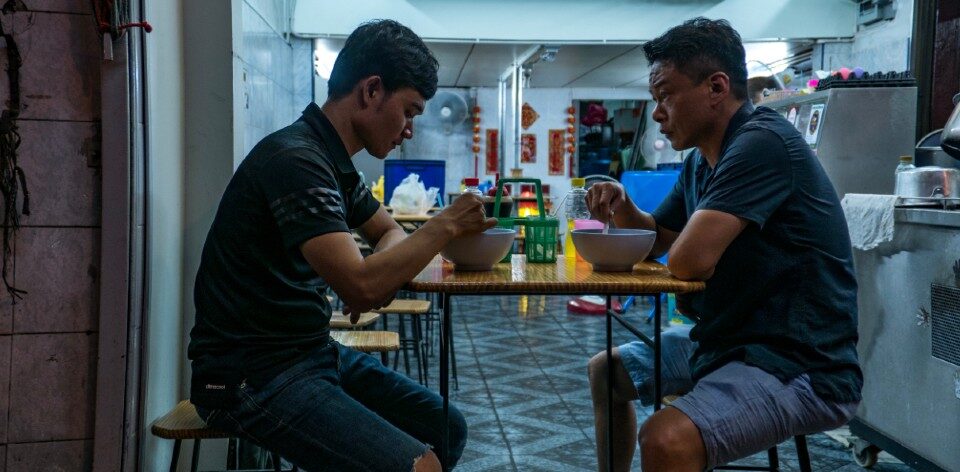Tsai Ming-liang, to put it mildly, is not a filmmaker for all tastes. His long takes and observational approach ask the audience to do a lot of the heavy lifting, which is refreshing in a way. Arguably the foremost purveyor of slow cinema, he cheekily opens DAYS (日子) with a note saying that the film is intentionally unsubtitled. Of course, there’s nary a line of dialogue to be heard in its leisurely two-hour runtime, immediately marking this film with a wry sense of humour.
In a series of lengthy takes, Tsai introduces us to the middle-aged Kang, played by his regular collaborator Lee Kang-sheng. We watch him stare out the window of his minimalist apartment before following him throughout his day. We observe him at worship, carrying out chores, and seeking treatment for his neck pain. During the latter he encounters Non (Anong Houngheuangsy), who Kang later pays for a massage and interacts with socially.
The lengthy production of DAYS almost mirrors the measured approach of the film. Tsai started work on the film as far back as 2014, following the success of Stray Dogs. Photography picked up again in 2017, travelling back and forth between Taiwan and Houngheuangsy’s home in Thailand. While working on various projects in between, including Your Face and Light, the film’s long post-production and release was further delayed by the global pandemic. This is one of the rare cases where that series of hurdles have resulted in a more polished product.
Like all of Tsai’s films, there is no sense of urgency to what we are seeing. The opening scene lingers for a full five minutes before transitioning to equally lengthy and meditative shots of Kang in a bathtub, or contrasting sequences of nature and the city. There is one shot of the exterior of a building that almost seems like a still photography — save for the odd movement of traffic seen in reflection.
The centrepiece, if such a thing could said to exist in this slow-marching film, is a full-body massage Kang hires Non to perform. Shot almost entirely from the waist up, Kang lies face down on a hotel bed while the initially unseen Non slowly massages him. Lasting almost 20 minutes in total, it transcends the initially transactional exchange into some highly intimate and almost seductive. In many ways it feels like a continuation of a theme, with early Tsai films like I Don’t Want to Sleep Alone coming to mind.
By comparison, the shower scene that follows is almost ceremonial and perfunctory in its approach. Both scenes pay off in a tender moment where the two men sit at the end of the bed, and Kang hands Non a music box. It’s an unspoken moment that is suggestive of something more in their exchange. Cinematographer Chang Jhong Yuan captures it all with just the right amount of distance, culminating in that one perfect shot: the pair eating at a takeaway joint, a moment captured from across the road. In comparison to what has come before, it’s as fleeting as the busy street traffic that separates us from the leads.
The bittersweet ending does not offer any conclusions, and nor would one expect them. Yet it does indicate a progression, a departure and a kind of handover. Whatever it was that Kang has been carrying around is for the much younger Non now, which is where Tsai leaves us in contemplation.
2020 | Taiwan | DIRECTOR: Tsai Ming-liang | WRITER: Tsai Ming-liang | CAST: Lee Kang-sheng, Anong Houngheuangsy | DISTRIBUTOR: MIFF 2021 | RUNNING TIME: 127 minutes | RELEASE DATE: 5 – 22 August 2021 (MIFF 2021)




